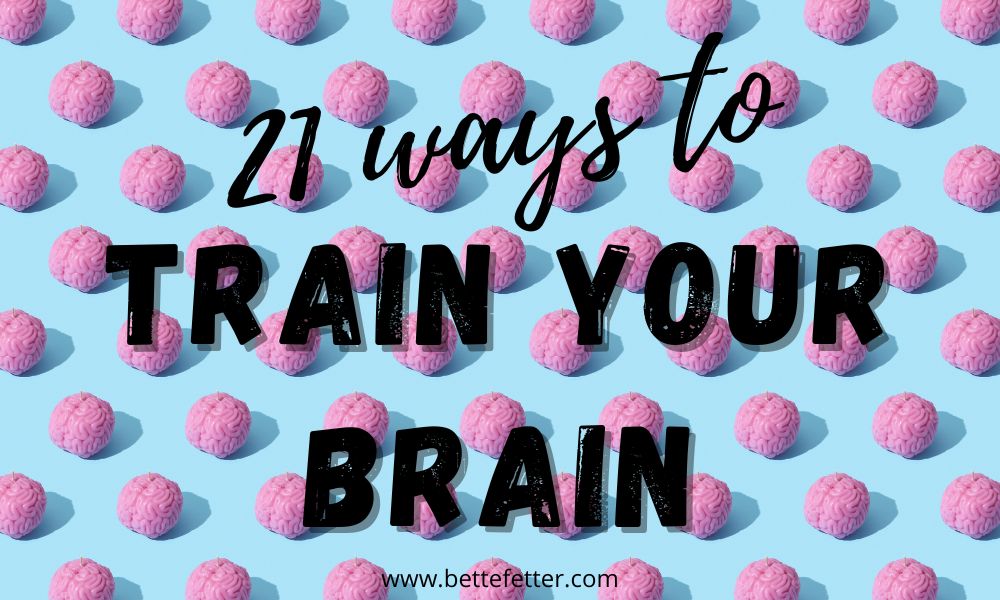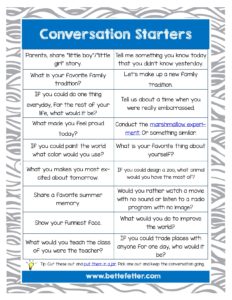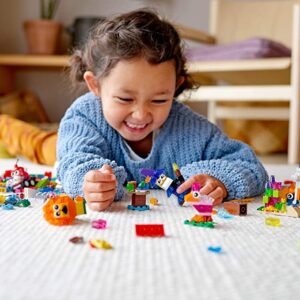21 Ways to Train Your Brain
 “Use it or lose it!” We usually hear this phrase applied to our bodies and muscles. But our brains require exercise as well. October 13th is National Train Your Brain Day, a day that recognizes the power of the mind, and how training it to be positive can change human lives.
“Use it or lose it!” We usually hear this phrase applied to our bodies and muscles. But our brains require exercise as well. October 13th is National Train Your Brain Day, a day that recognizes the power of the mind, and how training it to be positive can change human lives.
Our children come with lots of room for rewiring their thought processes and mental acuity. Train Your Brain Day is a terrific opportunity to help them practice using their brains in diverse ways. I have found a few simple ways for you to encourage your child (and yourself) to train your brain.
- Elevator breathing or deep breathing helps improve memory and emotional control. Breathe deeply bringing it up to the top floor (head) and out through bottom floor (toes).
- Play connect the dots– look for something in your line of vision on your right and another in your left side move your eyes back and forth to connect them. Cross body exercises promote integration between essential brain functions, leading to an overall better-performing brain.
- Try using your non-dominant hand to complete daily tasks to activate the other side of your brain. When we exercise both sides of the brain together, we are helping various functions of the brain work more collaboratively and stay coordinated.
- Play some board games like chess, checkers, or Sequence. These games teach your brain how to plan and strategize future moves for both you and your opponents.
Have a conversation with each other. With social media and technology usage, many of us have lost the art of talking to one another in person. Formulating your thoughts on the spot is a skill that takes practice for sure! Try these conversation starters.
- Play Concentration or Memory to improve memory, concentration, and visual recall.
- Drawing is a great activity for creative development. It stimulates the brain and assists in other areas of development such as communication and expressing emotions.
- Telling riddles activates pre-frontal cortex, the area of the brain responsible for reasoning, problem solving, comprehension, impulse-control, creativity, and perseverance.
- Write about it– putting your thoughts to print via journaling, social media posts, etc. can be both therapeutic and brain building as you edit your writing.
- Logic puzzles such as word search, crosswords, Sudoku, sharpen logic and reasoning by honing your critical and analytical thinking skills.
- Reading helps expand your child’s vocabulary along with enhancing their imagination. This helps with creative development along with improved language skills.
- According to research by NCBI, “Jigsaw puzzles tap multiple cognitive abilities and are a potential protective factor for cognitive aging.”
Building with Legos or blocks helps a child become more aware of things like balance, weight, space, and gravity. It also helps develop problem-solving skills as they figure out the best way to realize their vision.
- Go to bed 15 minutes earlier. Give your brain a few extra minutes to replenish and store memories from the day.
- Take a class to learn a new skill and build more pathways in your brain. It does not have to be a college course. An online tutorial will work simply fine.
- Learning a new language helps to boost memory, increase problem-solving and critical-thinking skills, enhance concentration and the ability to multitask, and improve listening skills.
- Switch up the routine to force your brain to do some problem-solving, rather than coasting on autopilot.
- Reducing your screen-time allows your brain to slow down and focus on tasks without distraction. This increases your ability to focus, regulate emotions and helps you organize thoughts and tasks.
- Learning to play an instrument helps boost memory. And helps with hand-eye coordination as well while learning to play the instrument and reading the music at the same time. It can also help improve skills in mathematics.
- In contrast to filling your brain with new skills and ideas, mindfulness and mediation practices help us clear our minds, improving focus and clarity.
- Cooking together teaches children how to follow a plan and introduces measurement concepts. Plus, it usually results in something delicious to eat releasing the brain’s feel-good chemicals, dopamine, and serotonin.
Try a few of these ideas to engage different areas and train your brain today!
We are a participant in the Amazon Services LLC Associates Program, an affiliate advertising program designed to provide a means for us to earn fees by linking to Amazon.com and affiliated sites. This post contains such affiliate links.









 Have a conversation with each other. With social media and technology usage, many of us have lost the art of talking to one another in person. Formulating your thoughts on the spot is a skill that takes practice for sure! Try these
Have a conversation with each other. With social media and technology usage, many of us have lost the art of talking to one another in person. Formulating your thoughts on the spot is a skill that takes practice for sure! Try these 

